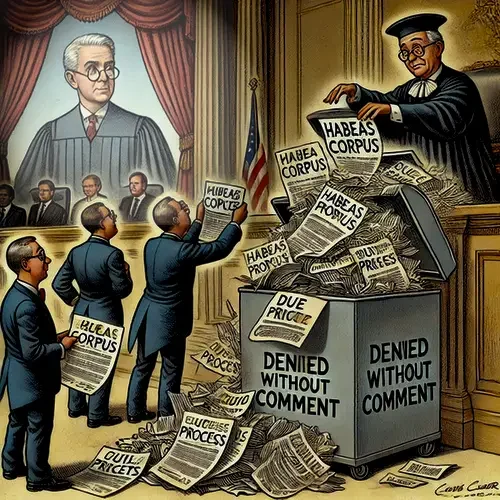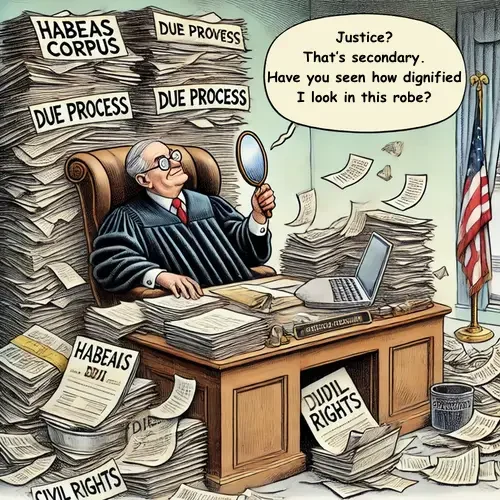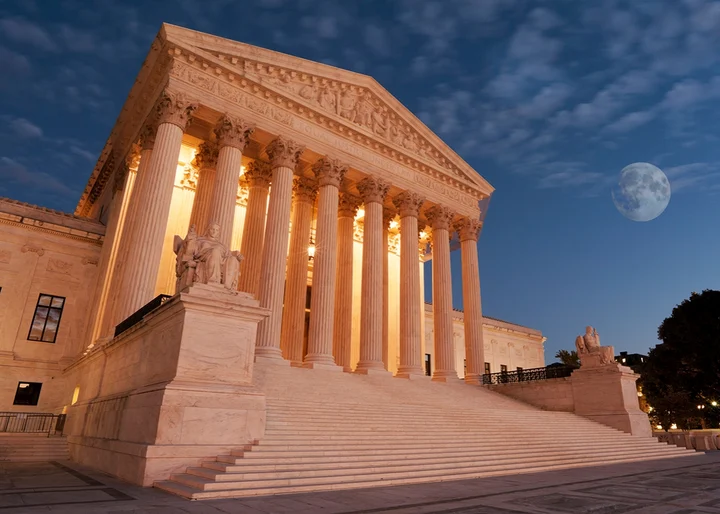Appellate Courts are Biased.

This may come as a shock to some of you, but Appellate Courts are not interested in your justice. The truth is they could care less if you are innocent, if the police committed crimes, if the prosecutor committed felonies to rebut the presumption of innocence and obtain a conviction. As disgusting as such a thing is, it does not change the fact that it is.
The result of years of media portraying defense attorneys as getting the murderer off because the cop failed to use his turn signal has created a society that is very jaded towards fundamental constitutional rights. That led to a belief that the prosecutor is noble and more popular. Which led to more judicial appointments. And that led to more prosecutors being appointed to the appellate courts and Supreme Courts. The result is an entire system of prosecutors judging if another prosecutor was wrong.
So you think you are innocent?
This is permitted to continue because of the ignorance of the masses. The population foolishly believe that if they do nothing wrong, they do not need to worry. Yeah, like no one in the world has ever been falsely accused. No one has ever lied on the stand. And certainly no one with a motive would do those things.
The truth is that those are the very reasons for the jury trial requirement. “Those who wrote our constitutions knew from history and experience that it was necessary to protect against unfounded criminal charges brought to eliminate enemies… Providing an accused with the right to be tried by a jury of his peers gave him an inestimable safeguard against the corrupt or overzealous prosecutor” (Duncan v. Louisiana, (1968) 391 U.S. 145, 156)
In 2013, Bill Maher had the former director of the NSA on his show, they were discussing a great American hero, Edward Snowden. Specifically, the growing sentiment among Americans that they did not care if the government read email because they were not committing any crimes. The man in charge of the most intense domestic spy entity said in response:
“It’s not whether you have committed a crime or not. It’s whether the government decides to think that you have committed a crime.”
The Appellate Game is a Human Game

So if everything is stacked against us, and they could care less if we are innocent, and truly care less if the government committed crimes to prove you were a criminal, then what the ___ are we supposed to do?
Luckily, most appellate justices have super massive egos. They love their own intelligence very deeply. About the only thing they love more is showing off how smart they are. Which they often screw up.
But that is not to say that their ego is not our friend. The one thing you need to look for, is an issue that is not decided yet. An issue of first impression is like gold to them. But it has to be useful. Being the first to write about a super boring point, will not show the world how great they are, because no one will read it.
Your author has written a lot of motions, petitions, appeals, and bids to get the supreme courts to hear a case. One almost resulted in the California Supreme Court granting review. Which shows how many times failure was enjoyed. But failure leads to innovation and thus to future success.
As a result, the perfect case that hit every trigger was presented to the U.S. Supreme Court, 6 to 5 split against controlling precedent on a super important issue. Denied. We were beat to the finish line by 29 days. They had just granted review on another case, on that very issue.
More on the supreme courts in a minute.
At the appellate level, this is in reality, your last chance to have the case looked at. So of course you want to always raise your most glaring errors. Then you should try to find something new that has not been decided yet. Its not always that easy, but since very rarely are facts the same, your case is different and unique. Find out why, then build on that. Then after that you should also raise errors that are favorable to you. And no matter what, show how you were prejudiced as a result.
Quick Word on Proving Prejudice in Your Case on Appeal
Prejudice is a complex topic that shifts, but in its most simplest form, it means there was error and that error prevented you from winning.
Say a hearsay statement is wrongly introduced, clear error. That statement even identified you as the culprit. Thus without that error you would have won.
You are not off so easy, yet. You have to look at the whole case, if they have video of you and you confessed, then removing the statement would not have effected the result and that results in no prejudice.
But if you can show that in the whole record there was no other identification except for that hearsay statement, then that error becomes highly prejudicial.
The Secret to Building a Better Chance with the Appellate Courts
You must pick the right issues and then present them the right way. This entire article was inspired because of a brilliant collection, put together by two brilliant men, that I know nothing about. Yet the quality of their work leads to the conclusion that they are awesome. The article discusses the standards of review. How to recognize which ones apply and how to craft your case to fit in the more favorable ones.
Special shout out with much love and gratitude to Jonathan Grossman and Dallas Sacher and their work:
STANDARDS OF REVIEW AND PREJUDICE AND HOW TO SATISFY THEM
That is the most important thing you must know if you want a chance at winning. Please read it many times. Download the PDF, highlight it, review it, and use the cases cited in it.
Then read it again. The standard of review will make you or break you. Some standards require all inferences and conclusions be made against you. Others require the justices to start the case with fresh eyes. Picking the right one is mission critical.
Do you want to raise an issue that:
“In resolving the issue of the sufficiency of the evidence, we are bound by the established rules of appellate review that all factual matters will be viewed most favorably to the prevailing party and in support of the judgment. All issues of credibility are likewise within the province of the trier of fact. In brief, the appellate court ordinarily looks only at the evidence supporting the successful party, and disregards the contrary showing. All conflicts, therefore, must be resolved in favor of the respondent.” (Nestle v. City of Santa Monica (1972) 6 Cal.3d 920, 925-26, citations omitted and cleaned up, italics in original.)
The Second Most Important Aspect After Standard of Review
You must, and I mean must, cite to the record. If you state a fact, it must be followed by a citation to the record.
Record citations vary according to your local court but generally they will be along the lines of references to the Reporter’s Transcript (RT) or the Clerk’s Transcript (CT) if you are on appeal. Or to your Petition’s exhibits (Ex.) if on habeas or mandamus.
If the reference is to the Reporter’s Transcript you will also need to cite to the lines on the page. (On the left side of each page are numbers, 1-28). A typical citation would look like this:
“Mary was at the store.” (RT24:1-6)
That says Reporter’s Transcript page 24, lines 1 through 6.
If you have more than one volume you need to include that as well. Say the above was in Volume 3.
“Mary was at the store.” (3RT24:1-6)
If the quote goes over into the next page you would write it like this:
“Mark waited in the car, with the engine running and had the radio playing. Mary was at the store.” (3RT23:27-24:6)
That said: Volume 3, Reporter’s Transcript page 23, starting at line 27 and continuing onto page 24 and ending on line 6.
If you make a statement of fact, it must be followed by the location in the record. If you have an entire paragraph and its all in the same location then that is ok too. You would cite a reference to your entire brief below as:
See Motion to Suppress, 1CT67-203.
Where it gets a little tricky is when you have 3 or 4 paragraphs that are all in the same page of the record. The problem with citations to the record is that it consumes word count.
Because you only get so many, so citing the record for every sentence with the same record citation consumes massive word count and disrupts the flow of reading. If citing to a number of paragraphs you could do something like. (Last two paragraphs 2CT23-24)
“A party on appeal has the duty to support the arguments in the briefs by appropriate reference to the record, which includes providing exact page citations. We have no duty to search the record for evidence and may disregard any factual contention not supported by proper citations to the record.” (Air Couriers Internat. v. Employment Development Dept. (2007) 150 Cal.App.4th 923, 928; Sharabianlou v. Karp (2010) 181 Cal.App.4th 1133, 1149 [“we will not scour the record on our own in search of supporting evidence”].)
Keep an Eye on the Future and Prepare Now for Possible Supreme Court Review
The last court required to hear your appeal is the appellate court. The supreme courts are purely discretionary. Which means, if they feel like it. Above when I mentioned the almost successes I had, it came from an article I read.
It was on the last day to submit after working 10 days straight. I read that article and threw the brief away and started over, one day on the clock.
The Supreme Courts are not there to ensure justice for you. They are there to ensure there is uniformity.
This is what that article said: The more you show how right you are and how clear the error was, the more you show the law is well settled and there is no need for them to review your case.
The correct showing is: I don’t know if the court was right, maybe they were, maybe they weren’t. This case says yes, that case says no.
Before the appellate courts you want to be certain and show them how right you are. But as you research, when you find cases against you, start collecting them off to the side. Open a new word document and label it “negative cases on [your issue]”. Then when you come across them, just copy and paste the case citation (I embed the url or paste the url along with it for faster access).
Then later, when preparing for the supreme court, and you are super depressed that you lost, it will be easier. Because you already did yourself the massive favor of gathering cases that say you suck (which really suck to read when you already feel defeated). Then when asking the high court to look at it, you can show them you do not know if the lower court was right. These 5 cases say yes, these 6 say no.
Other subtle clues are there for you to find
The California Supreme Court also cares a great deal about conflicting lower courts. But they are also prone to pick up important or new or unresolved issues.
Have you ever read a case that says in a footnote: we need not resolve that issue here today? If it is relevant to you, then save it!
“We now address an issue left unresolved by Tillman:” People v. Smith (2001) 24 Cal.4th 849, 851
“As a general rule, only ‘claims properly raised and preserved by the parties are reviewable on appeal.”’ [Which was code for, we want this one.] “We have, however, created a narrow exception to the waiver rule” id. … “could not lawfully be imposed under any circumstance in the particular case” [citation.] they are reviewable “regardless of whether an objection or argument was raised in the trial and/or reviewing court.” [Citation.] We deemed appellate intervention appropriate in these cases because the errors presented “pure questions of law” ( bid.), and were “`clear and correctable‘ independent of any factual issues presented by the record at sentencing.” [Citation.] In other words, obvious legal errors at sentencing that are correctable without referring to factual findings in the record or remanding for further findings are not waivable.” (Smith at 852)
Conclusion
Also the California Supreme Court keeps a list of all pending issues that review has been granted on for both civil and criminal. Read them every couple months to see what is cooking. They just may have your issue. If early, alert the appellate court. If they just decided it, you can ask the supreme court for a grant and transfer order. To make them consider it in light of the new decision. Because if they just decided it, they won’t need to hear it again.
Accept that this is a challenge, find the path to make it less hard. Play into their egos and prepare the arguments according to the correct standard of review. And support that work by citing to the record.
Read more about formatting and basic flow of arguments.

